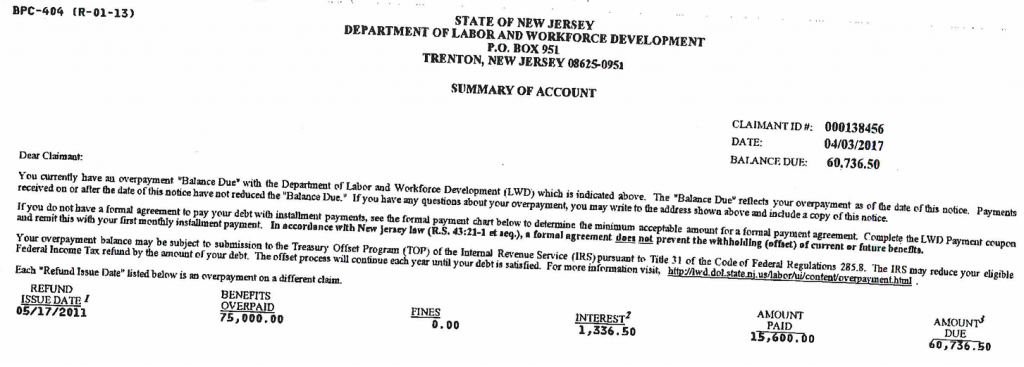Schorr & Associates’ Employment Case of The Week ending April 28, 2017
Koch v. Bd. of Review, 2017 N.J. Super. Unpub. LEXIS 1005 (App. Div. April 25, 2017)
Our firm won a significant victory for our client, Henry Koch, and for unemployment claimants with the Appellate Division’s decision in Koch v. Board of Review. It was the culmination of a very long battle involving the largest individual unemployment refund to ever be litigated.
Henry Koch became unemployed and filed for benefits way back in March 2010. He was initially approved for benefits based upon his statements about the separation. The employer did not respond at all and did not challenge the unemployment. The separation took place during the recession at which time unemployment benefits could be extended to 99 weeks. Mr. Koch collected benefits for a full year, but then received a notice that the Department of Labor had received information from the employer who was now claiming that Mr. Koch quit without good cause. The Department of Labor sought a refund.
Mr. Koch appealed to the Appeal Tribunal, which held that he had not quit and upheld his benefits. The employer then appealed to the Board of Review, which reversed and held Mr. Koch disqualified. By that time, Mr. Koch had already collected his entire maximum unemployment benefit. The Department of Labor sought over $60,000 to be refunded. Mr. Koch appealed to the Appellate Division. He argued that (1) he did not quit; and (2) that the employer should not have been permitted to assert an objection and appeal a year later when the law requires both employers and employees to appeal determinations within 10 days. N.J.S.A. 43:21-6(b)(1).
In its first opinion, the Appellate Division deferred to the Board of Review on the disqualification, but remanded to the Board of Review for a determination of whether the employer filed a timely appeal, and whether a waiver was in order given the lengthy delay. The Board of Review held an evidentiary hearing but did not subpoena the employer to produce proof that it had made a timely appeal. The Department of Labor similarly produced no evidence of a timely appeal. At the hearing Mr. Koch presented evidence that the employer did not appeal for over a year and did so then because they had hired a 3rd party administrator to handle their unemployment claims. He also presented evidence that the Department of Labor had been deliberately destroying evidence of employer appeals.
The Board of Review still held that the employer’s appeal was timely. Although not a scintilla of evidence supported its decision, the Board of Review ruled that the employer must have filed a timely appeal because “we cannot think of any reason why the employer would submit the form a year after the claim was filed.” Three additional appeals were held regarding waiver but the Board of Review refused to consider waiver. Mr. Koch took the appeal back up to the Appellate Division, who completely reversed and ordered that Mr. Koch was not liable for the refund.
The Appellate Division affirmed that the decision of the Board of Review was arbitrary and not supported by credible evidence. Most importantly for other unemployment claimants, the Appellate Division made it clear that employers are bound by the same statute of limitations for appealing unemployment decisions as claimants. So often we represent claimants in unemployment appeals that arise from a late appeal by employers. This case will help claimants argue that the Department of Labor cannot have different standards for employers and employees.
Appellate Judges: Nugent and Currier.
